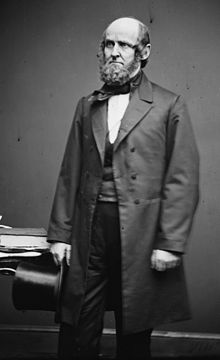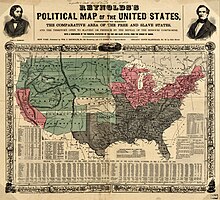Elbridge G. Spaulding
Appearance

Elbridge Gerry Spaulding (24 February 1809 – 5 May 1897) was an American politician, lawyer, and banker during the 19th century. He was also a former mayor of Buffalo, New York. A Republican, he was opposed to slavery and supported the Union during the American Civil War.
Quotes
[edit]

Remarks on the Republican platform (1860)
[edit]- Suddenly, and without the least necessity or provocation, the country was startled with a proposition to reopen the slavery agitation in a more aggravated form than ever before. The Kansas-Nebraska bill was introduced by Senator Douglas, Chairman of the Committee on Territories, sustained as a Democratic measure by President Pierce, and adopted by Democratic and Southern Whig votes. The bond of peace agreed to in 1850-51-52, was broken, and broken, too, by the very men who had pledged themselves not again to agitate the slavery question. … After a severe struggle, which threatened the integrity of the Union, Congress finally passed laws settling these questions; and the Government and the people for a time seemed to acquiesce in that compromise as a final settlement of this exciting question; and it is exceedingly to be regretted that mistaken ambition, or the hope of promoting a party triumph, should have tempted any one to raise this question again. But in an evil hour this Pandora's box was again opened by what I conceive to be an unjustifiable attempt to force slavery into Kansas by a repeal of the Missouri compromise, and the floods of evils now swelling and threatening to overthrow the Constitution, and sweep away the foundation of the Government itself, and deluge this land with fraternal blood, may all be traced to this unfortunate act.
- Whatever might have been the motive, few acts have ever been so barren of good, and so fruitful of evil. The contest has exasperated the public mind. North and South, and engendered feelings of distrust, and I may say hate, that I fear it will take years to wear away. The lamentable tragedy at Harper's Ferry is clearly traceable to this unfortunate controversy about slavery in Kansas.; and while the chief actor in this invasion has exhibited some traits of character which challenge our admiration, yet his fanatical zeal seems to have blinded his moral perceptions, and hurried him into an unlawful attack upon the lives of a peaceful and unoffending community in a sister State, with the evident intention of raising a servile insurrection, which no one can contemplate without horror; and few, I believe very few, can be found so indifferent to the consequences of his acts, or so blinded by fanatical zeal, as not to believe that he justly suffered the penalty of the law which he had violated.
The Whig party North and South having been completely broken up by the perpetration of this great wrong, and the subsequent attempt of the slave power, backed up by the President of the United States, to force slavery upon an unwilling people in Kansas, and by fraud and violence to make Kansas a slave State, a new phase was given to public affairs and to the parties in the country. The Democratic party became greatly divided and distracted by this outrage, and would also have been entirely demolished, if Southern States had not rallied to the support of that party. All the Southern States, with the exception of Maryland, having gone over to the support of the Democratic party, and the aggressions of the Southern propagandists of slavery in their attempt to send slavery everywhere, the Democratic party became essentially a Southern sectional party, inasmuch as very few public men South, of either party, could be sustained by their constituents in opposing these outrageous measures in Congress, and the frauds and rascalities committed in Kansas. All the compacts, resolutions, and agreements, to keep the peace, so recently made, having been broken, confidence was greatly impaired, indeed I may say entirely destroyed, in the Democratic party, and in this state of things a new party was formed, called the Repuulican Party, to resist the Democratic party in its new and alarming attitude of pro-slavery aggression.
- This new party was made up of Northern men from the ruins of the old Whig party, the Free-Soil Democracy and all friends of true republican liberty who desired to see the Sham Democracy overthrown, and the National Government brought back to the principles of Washington and Jefferson and the fathers of the Republic.
- The Republican Party recognizes the right of the majority to govern, and their power to enforce that right against all attempts at disunion, come from what quarter they may. It is based upon the great fundamental principle upon which the National Government rests, that the Constitution, and all laws made in pursuance thereof, are to be faithfully observed and enforced, and it demands economy and a rigid accountability on the part of all public officers.
- The Republican Party insists that slavery originated in force, by the stronger against the weaker party, and not by natural right; that it is maintained and upheld by oppression and wrong, and against the law of nature. This usurped ownership in man is not that kind of property which is recognized by the general consent of mankind.
- The advanced state of civilized society does not recognize the right of one man to own another man against his will. The inalienable right of life, liberty, and the pursuit of happiness, is conceded to all. The right of every man to himself, to enjoy the fruits of his own ingenuity and industry, are among the natural rights of every person made in the image of God.
- The Republican Party was organized in 1854-55, upon the platform of liberty and independence, to maintain the union of the States and the rights of the States; freedom of speech and the press; to resist the spread of slavery and the aggressions of the slave power; the equal rights of all persona to impartial protection at home and abroad, and in the enjoyment of religious freedom; and of all American citizens, whether native or naturalized, to the free exercise of the elective franchise and the enjoyment of its benefits; and requiring no test for office except honesty, capacity, and devotion to American institutions.
- Accessions have continually been made to the Republican Party, ever since its organization, it has won to the support of its principles good men, from time to time, from all the other parties, until it now embraces the best men of the country. It has become a compact and overshadowing organization, sufficiently powerful to take possession of and to administer the Government, upon the great principles of liberty, equality, and justice, as embodied in the Declaration of Independence and the Constitution of the United States.
- The Republican cause is onward. Every man who desires good government has an important political duty to perform, and, with a united and determined effort, the country will be redeemed from the misrule of modern Democracy.
External links
[edit] Encyclopedic article on Elbridge G. Spaulding on Wikipedia
Encyclopedic article on Elbridge G. Spaulding on Wikipedia
